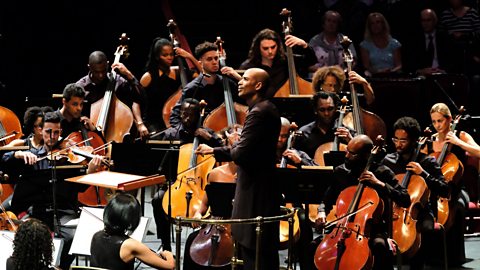From puppet turkeys to tin-foil outfits, gorilla suits to flight-attendant uniforms, Eurovision has certainly given us some memorable performances over the years.
But how familiar are you with some of the cultural references hidden in the lyrics, music genres and costumes?
Every year Eurovision introduces us to a host of new performers from across Europe, each with their own style, background and approach. Sometimes, the acts use this opportunity to introduce the world to a particular aspect of their culture or to make a point about the world around them.
Join ±«Óătv Bitesize as we delve into the meaning behind the glitter, ballads and pyrotechnics.
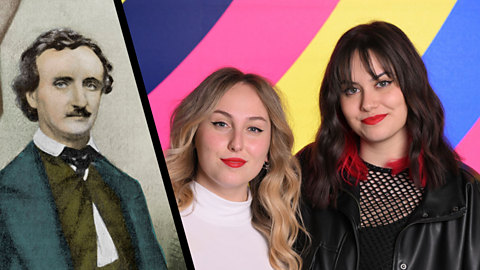
Edgar Allan Poe, Poe, Poe, Poe, Poe
âWho the Hell is Edgar?â ask Austrian singers Teya and Salena in their 2023 Eurovision entry. The Edgar in question is in fact the celebrated 19th Century American poet and short story writer, Edgar Allan Poe. Influenced by the Romantics, his work is know for its focus on mystery, horror and the macabre. The Raven (1845) is arguably his most famous poem, and he is often credited with helping to establish the detective story genre.
In this humorous song, the duo sing about being possessed by Edgarâs ghost, saying thatâs why theyâre able to produce such brilliant lyrics: âDon't know how he possessed me, but I'm happy that he did/'Cause this song is feeling special, and is gonna make me richâ.
Underneath the humour, Teya and Salena are making a serious satirical point about the barriers female songwriters can face in the music industry. When explaining the meaning of the song, theyâve spoken about how theyâve found it hard to get people to take them seriously and that by claiming their lyrics are actually written by a celebrated male writer, the song might receive more attention.
This is not the first time Edgar Allan Poe has been referenced in a Eurovision song, though. He also gets a mention in the 1990 runner-up from France, White and Black Blues, sung by JoĂ«lle Ursull. The lyrics talk about racism, with JoĂ«lle singing: âWhen someone talks to me about skin colour/I have the blues which sends shivers down my spine/I feel as if I'm in a tale by Edgar Allan Poeâ. She was the first black woman to represent France in Eurovison.

Shoe-Be-Doo
When Anna Mjöll ĂlafsdĂłttir of Iceland sang the jazz-style song âSjĂșbĂdĂșâ in 1996, the titular lyric purposefully sounded a lot like âShoo-Be-Dooâ, a vocalisation that appears in the work of many mid-century singers and vocal groups, who sang in the doo-wop genre. It's a musical style recognised all over the world, as Anna sings: âPeople understand it even on Skagaströnd and Timbuktuâ (âMenn skilja jafnt ĂĄ Skagaströnd og TĂmbĂșktĂșâ).
Within the song, Anna lists a number of singers who are associated with this genre and are recognised globally. These include Louis Armstrong, Nat King Cole, Ella Fitzgerald, Sammy Davies Jr and Elvis Presley.
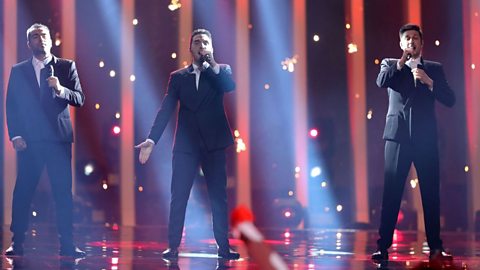
An intangible piece of heritage
Hidden within the band name of Georgiaâs 2018 entry, the Ethno-Jazz group Iriao, is a clue to their unique musical style and commitment to their countryâs cultural heritage. Iriao is taken from the phrase âIriao-uruaoâ, often used in a specific type of Georgian yodelling called Krimanchuli. This is a feature of traditional Georgian polyphonic folk music, recognised by UNESCO on their Representative List of the Intangible Cultural Heritage of Humanity.
David Malazonia, who leads the band and helped composed their entry For You, is considered to be at the forefront of this music genre in Georgia. The band interweave the traditional Georgian folk style with jazz elements, and have subsequently played at jazz festivals worldwide, as well as Eurovision.
Another entry which honoured its countryâs traditional folk music came in 2006, when Bosnia & Herzegovnia sent Hari Mata Hari with the song Lejla. Their song was influenced by a type of folk music known as Sevdalinka or Sevdah music. Sticking to their roots worked well for Hari Mata Hari as they finished third in the final, Bosnia & Herzegovina's highest Eurovision finish ever.

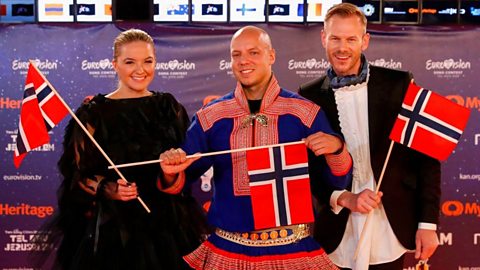
Introducing Sami culture
In 1980, the culture of Norwayâs SĂĄmi-speaking people was acknowledged in Sverre Kjelsberg and Mattis HĂŠttaâs entry entitled Samiid Ădnan. The title comes from the largest of the Sami languages, Northern Sami, and can be translated as Sami Earth or Sami Soil.
Sverre sung the primarily Norwegian lyrics, whilst Mattis sung the chorus in joik or yoik. This is a traditional chanting style of Sami music that has been passed down through the generations for centuries. It typically doesnât use many full words, but rather syllables. When lyrics are used, they tend to refer to people, nature and the relationships between them, often in quite personal or spiritual ways.
In a surprising turn of events, Samiid Ădnan has been adopted by supporters of Accrington Stanley FC, who have been known to sing the tune in the stands. You might also recognise this style of music from the opening song of Disneyâs Frozen (2013), Vuelie, which was composed by the South Sami joiker Frode Fjellheim.
More recently, in 2019 the Norwegian group KEiiNO entered Eurovision with the song Spirit in the Sky which mixed English lyrics with a joik chorus. The group was formed when two Norwegian singers, Alexandra Rotan and Tom Hugo Hermansen, teamed up with the SĂĄmi rapper and joiker Fred Buljo. Their entry was particularly apt that year, as 2019 was the UN's International Year of Indigenous Languages.
This article was published in May 2023
Seven Eurovision facts to make you sound like an expert
Test your musical knowledge with these seven fun Eurovision facts - do you know them all?
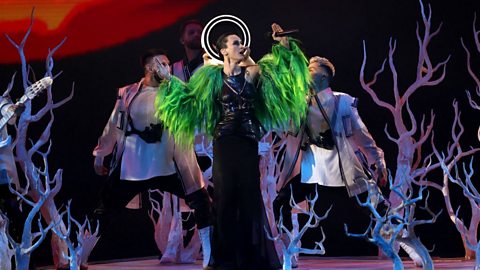
Can you take on the Eurovision big numbers quiz?
How well do you know the facts and figures of Eurovision? Take the quiz to find out!

Classical music is everywhere in pop culture if you look hard enough.
